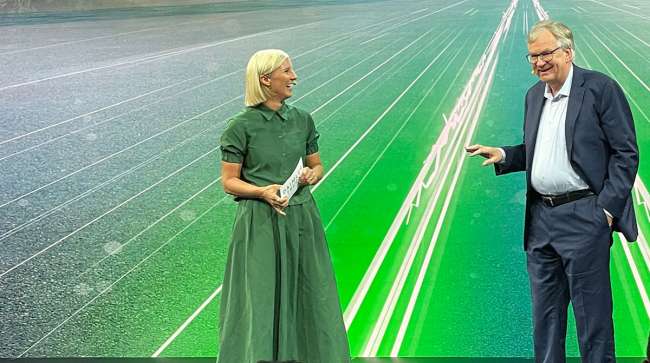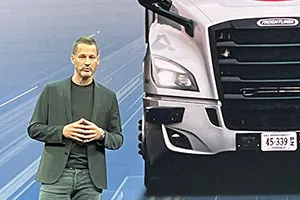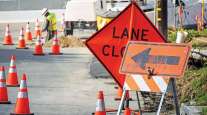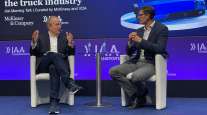Executive Editor
Daimler Execs Call on Governments to Act on Infrastructure

[Stay on top of transportation news: Get TTNews in your inbox.]
HANOVER, Germany — Leaders from Daimler Truck are calling on governments to help advance the buildout of electric vehicle charging infrastructure, stressing from IAA Transportation 2024 that the dearth of available charging options is the missing piece that will propel broader adoption of EVs among commercial buyers.
“It’s not just about the trucks,” said Mercedes-Benz Trucks CEO Karin Radstrom, who on Oct. 1 will become CEO of parent company Daimler Truck. Speaking directly to governments, Radstrom said her company has done its part in introducing zero-emission trucks into the marketplace. Now, she said, it’s up to lawmakers and regulators to create a framework that advances and incentivizes investment in electric vehicles and infrastructure.
“Our zero-emission vehicles are ready and now our infrastructure must follow,” Radstrom said during a Sept. 15 media event. “This is really important because infrastructure is becoming the roadblock for sustainable transportation.”
RELATED: Daimler Broadens Global Platform of EVs, Services
Asked by Transport Topics during a media roundtable the next day how original equipment manufacturers can compel governments to act, Radstrom said, “That’s the best part of my job. We have a lot of dialogue with the government, and we are actively trying to influence legislation in a good way. It favors industry and the government when we come to good solutions.”
Our zero-emission vehicles are ready and now our infrastructure must follow.
Mercedes-Benz Trucks CEO Karin Radstrom
Daimler Truck CEO Martin Daum — who will remain on the company’s board through year’s end after Radstrom ascends to the top job — said crafting the right narrative around decarbonization efforts is key to both industry and governmental adoption, and reflected on a lesson he learned in his long career with Daimler to assert what stakeholders must do.
“Don’t do what is popular,” he said. “Do what is right and make it popular.”
Daum said he is making the case to lawmakers, stressing that industry and government must work together toward shared goals.
We have to change faster rather than slower — and this is an enormous task — and we are up for that task.
Daimler Truck CEO Martin Daum
“We need to change to zero emissions,” he said. “We are not doing that because some regulators had some bad days and want to punish the industry. We are changing to zero emission because we want to stop global warming and climate change,” Daum said. “I tell it to politicians over and over: We truckers are not the problem. We are the solution.”
He stressed that while Daimler is committed to clean diesel technology during this transition, the manufacturer faces a daunting task in rolling out new technologies.
“We have to change faster rather than slower — and this is an enormous task — and we are up for that task,” he said.

Andreas Gorbach, Daimler Truck's head of technology, says pressure to decarbonize has been put on OEMs when all stakeholders should be contributing. (Joe Howard/Transport Topics)
Daimler Truck Head of Technology Andreas Gorbach said governments have options to help, especially as it relates to advancing buildout of infrastructure.
He noted that while existing European Union regulations set targets for both electric and hydrogen infrastructure buildout across EU member states, those targets are insufficient to meet the targets set for manufacturers. Plus, he said only manufacturers face penalties for missing their targets.
“If the member states don’t build out the infrastructure, nothing happens,” he said. “If we don’t sell enough trucks that are CO2-neutral, we have to pay draconic penalties.”
Gorbach also said these circumstances are putting undue pressure on OEMs at a moment when all stakeholders should be contributing.
Leading sustainable transportation - we proudly present our electric product range at the #IAATransportation2024
Join us as we shape the future of transport logistics together in Hanover. Meet us in hall 19/20.
https://t.co/Bhx8M3UXVe#DaimlerTruck pic.twitter.com/IB9SP9bPD5 — Daimler Truck (@DaimlerTruck) September 16, 2024
“At the moment, I have the feeling that people are watching us as manufacturers fail,” he said.
“This is not an industry problem. This is a problem that needs to be solved by all stakeholders involved. Society, politics and us. And it’s not enough to set targets for the manufacturers and penalties for the manufacturers.”
He noted that current regulations in Europe require manufacturers to reduce by 45% the CO2 footprint of the vehicles they sell between 2019 and 2030.
TT's Seth Clevenger and Mike Senatore dive into the details behind the 2024 Top 100 Private Carriers list. Tune in above or by going to RoadSigns.ttnews.com.
“Without the infrastructure, that’s not going to happen,” Gorbach said. He suggested tying infrastructure targets to vehicle targets as a way of aligning goals.
“Now is the time to couple the infrastructure targets — a hard coupling — with the targets for the OEMs. And that’s not done yet,” he said.
Radstrom also said better planning is needed, and similarly called on a broad coalition to work jointly toward solutions.
“I take every opportunity, including tonight, to appeal to all stakeholders that we need a better, faster and a more comprehensive plan for green infrastructure. So, let’s work together on that,” she said at the Sept. 15 event. “We are ready. We deliver on our vision to lead sustainable transportation. To get there, every truck counts, every bus counts, every charging station counts and every kilowatt of green energy counts.”
Thank you for watching our Daimler Truck Media Night! Let’s shape the future of transportation!
In case you missed it, you can find the recording here: https://t.co/f0K3cJjG5h #DaimlerTruck #IAATransportation2024 #LeadingChangeNow pic.twitter.com/hOtLCPbwxc — Daimler Truck (@DaimlerTruck) September 15, 2024
Want more news? Listen to today's daily briefing below or go here for more info:





